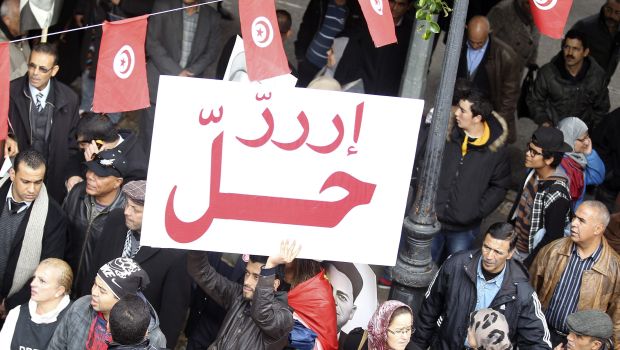
Members of the main labor union body, UGTT, gather during a protest calling for the government led by the Islamist Ennahda party to step down in Tunis on December 4, 2013. The sign reads “Get out.” (REUTERS/Zoubeir Souissi)
Tunis, Asharq Al-Awsat—With Tunisia’s political transition still in doubt following a stalled National Dialogue, the National Constituent Assembly’s Compromise Committee has confirmed an end-of-year 2014 deadline for forthcoming parliamentary and presidential elections, a senior official told Asharq Al-Awsat.
In exclusive comments to Asharq Al-Awsat, the second deputy vice-president of Tunisia’s National Constituent Assembly, Larbi Ben Salah Abid, said: “All political parties in Tunisia are waiting for the Independent Electoral High Commission to finalize the date for the forthcoming presidential and parliamentary elections,” adding, “The deadline for the elections will be the end of next year.”
The 2014 elections will be the second following the 2010 popular revolution that toppled the Ben Ali regime. The country has been ruled by a troika of three parties—Ennahda, Ettakatol and the Congress for the Republic—since elections in 2011. The troika had agreed to step down from power after a political crisis engulfed the North African state following the assassination of two senior opposition leaders earlier this year.
The troika and the opposition are currently in discussions over the formation of a new government, with Tunisia’s powerful labor union currently in the process of seeking to broker an agreement between the ruling Islamists and secular opponents. On Wednesday, the labor union announced that it had given both sides 10 days to name a prime minister to lead a caretaker administration until elections.
Abid, who is a senior member of the Congress for the Republic, clarified that the Compromise Committee “anticipates the end of June 2014 as a preliminary date for elections,” adding that the date may change in order to ensure that elections do not clash with the holy month of Ramadan.
“The Committee therefore considered the remaining dates of the season, based around the reopening of schools and universities, and its members agreed a 2014 end-of-year deadline for the completion of elections, both the first and second rounds,” he added.
Abid also confirmed that the Compromise Committee had discussed “the matter of terminating the operations of the National Constituent Assembly.”
Tunisia’s National Constituent Assembly has been tasked with drawing up a new constitution for the country. However, more than two years after Ben Ali’s ouster, Tunisia’s political transition remains stalled, with many criticizing the performance of the constitution-drafting body. Earlier this year, the Tunisian National Constituent Assembly ordered the suspension of parliament following nationwide political and security clashes, leaving the assembly the most senior official body in the country.
“Views differed among [National Constituent Assembly] members; some felt that it is important to either hand over to an elected parliament or hand over parliament’s duties immediately after the ratification of the electoral law. Others believed that the Constituent Assembly should continue to meet for legislative reasons, if necessary,” Abid said.
